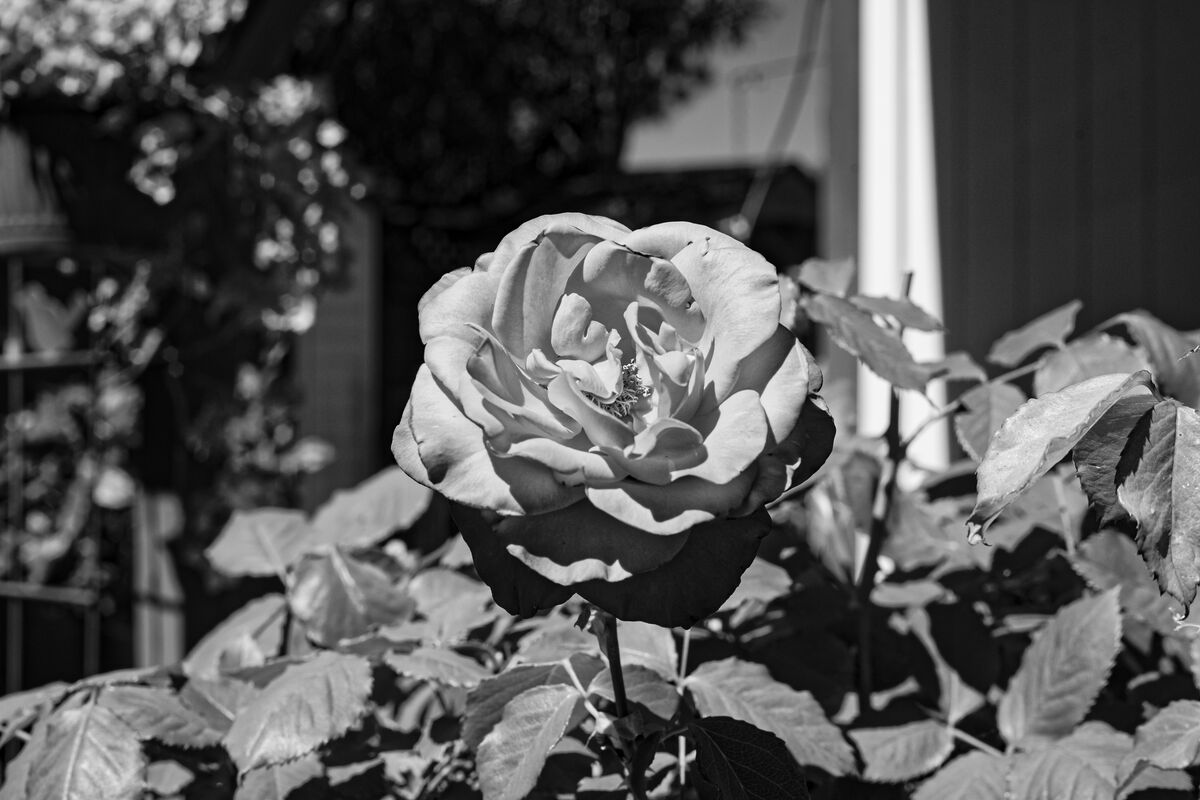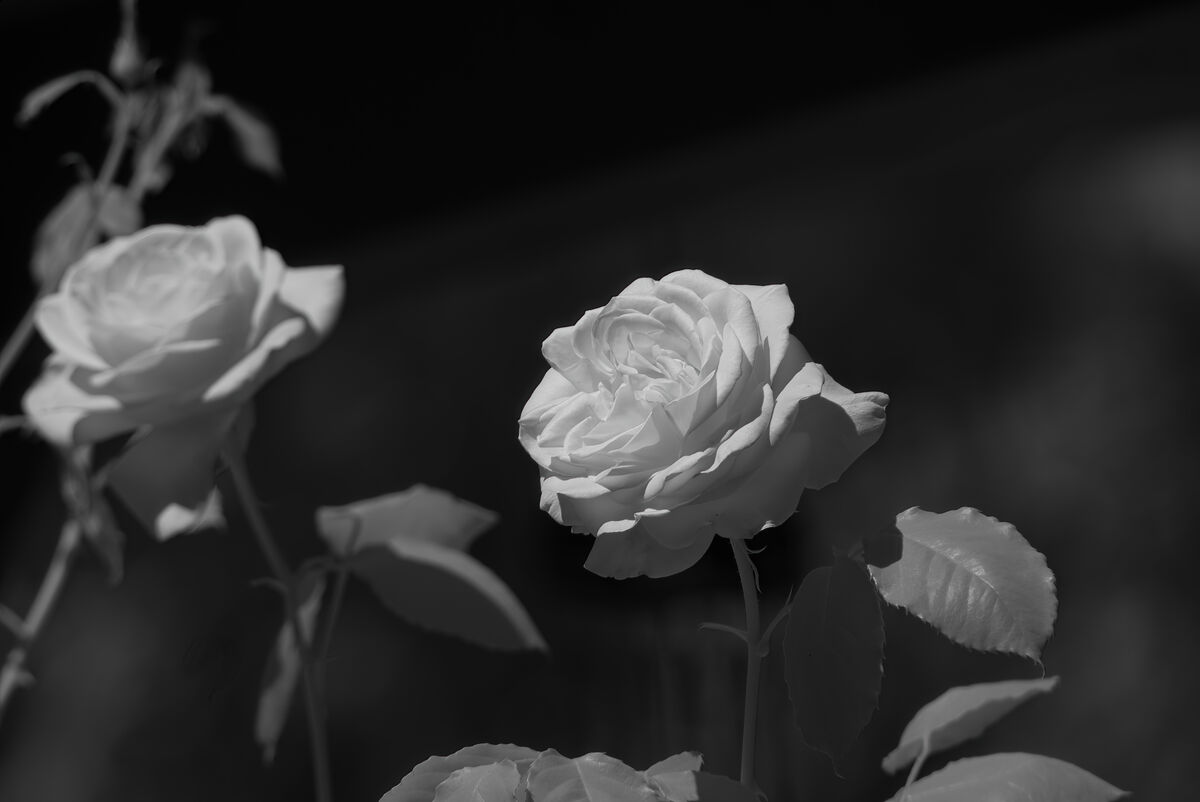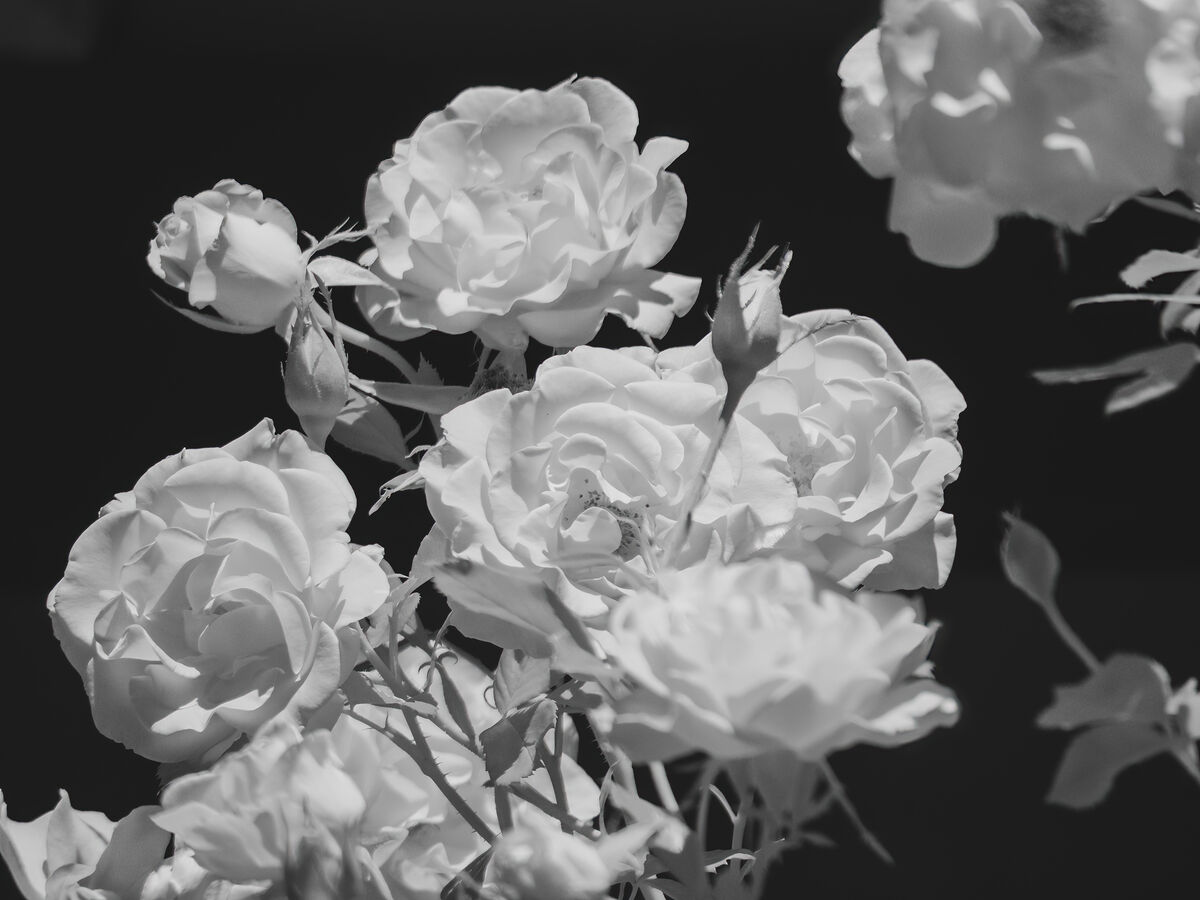Colored Filters on Digital Cameras
Mar 21, 2023 12:17:12 #
CHG_CANON wrote:
You'd be wasting your money. The camera captures i... (show quote)
I agree with CHG_CANON. Shoot in raw, then convert to B&W in post. I suggest you look at the NIK Suite. There are 8 different software products in the suite, all of them good, but the star is Silver Efex. With that, you can take B&W photography to a new level. Cost is $149, which is roughly what you might spend on a set of filters. There's a free trial.
Mar 21, 2023 12:35:26 #
Here is a comparison done two different ways. The first image was done in color and converted to B&W in Lightroom and used a simulated red filter on a red rose. The second image is also a red rose, but was taken with my camera which has been modified to be a mono sensor by the removal of the CFA. An actual red filter was used. One detail needs to be added is that this camera also is full spectrum IR since the UV-IR cut filter was also removed. But this represents the quality of B&W image that comes from using a mono sensor.
Now I admit that the two images were taken on different days and different times.
But I always get superior B&W results with the mono sensor. The tonality is better and the images are not as harsh.
***********************************************************
Adding a third image taken using an Olympus EM5ii that has been modified to be full spectrum IR. Taken with a red filter. Converted to B&W in Lightroom using the B&W11 filter. Note: A red filter passes red plus all longer wavelengths. And with a full spectrum camera, it sees those longer wavelengths resulting in what we see here.
My conclusion here is that having IR light in the image has a big effect on the resulting B&W image with it approaching what I got with the mono sensor camera. In fact I have noticed that I get much better B&W images consistantly with my full spectrum camera than I do from my visible light only cameras.
Now I admit that the two images were taken on different days and different times.
But I always get superior B&W results with the mono sensor. The tonality is better and the images are not as harsh.
***********************************************************
Adding a third image taken using an Olympus EM5ii that has been modified to be full spectrum IR. Taken with a red filter. Converted to B&W in Lightroom using the B&W11 filter. Note: A red filter passes red plus all longer wavelengths. And with a full spectrum camera, it sees those longer wavelengths resulting in what we see here.
My conclusion here is that having IR light in the image has a big effect on the resulting B&W image with it approaching what I got with the mono sensor camera. In fact I have noticed that I get much better B&W images consistantly with my full spectrum camera than I do from my visible light only cameras.
Image shot in RAW of red rose, converted to B&W in Lightroom with simulated red filter

(Download)
Image shot with mono sensor. Lens had red filter

(Download)
Full Spectrum IR with red filter. Camera has CFA.

(Download)
Mar 21, 2023 14:22:26 #
JimH123 wrote:
Here is a comparison done two different ways. The... (show quote)
“full spectrum IR” is an oxymoron. Full spectrum is full spectrum. You can use full spectrum camera with an IR filter to get IR results, or with a colored filter to get a combination of higher frequency visible wavelengths with IR.
Mar 21, 2023 14:32:00 #
larryepage wrote:
So let's get down to the brass tacks of reality he... (show quote)
That’s some serious spin. You said it’s better to shoot in B&W. I suggested the more flexible option to set the camera to B&W but shoot raw. You responded with nonsense about trying to get B&W prints from color negatives. I pointed out that shooting digital is completely different and that sensor data is the same whether you shoot B&W jpeg or raw, but that raw offers much more flexibility. Now you come back with this nonsense about flexibility. As for people shooting B&W today, I know several that do excellent B&aw work.
Mar 21, 2023 15:03:19 #
SuperflyTNT wrote:
“full spectrum IR” is an oxymoron. Full spectrum is full spectrum. You can use full spectrum camera with an IR filter to get IR results, or with a colored filter to get a combination of higher frequency visible wavelengths with IR.
Of course it is an oxymoron. But if I don't say it that way, there are some who don't know what I'm saying. And I do have UV-IR cut filters in various sizes so I can make it operate as a visible spectrum camera. But I rarely do this.
Mar 21, 2023 17:25:54 #
larryepage
Loc: North Texas area
SuperflyTNT wrote:
That’s some serious spin. You said it’s better to ... (show quote)
None of that is pertinent against the OP's question of whether a red filter can be used to enhance images when shooting in b&w. Nor are most of the other responses in this discussion.
Nor is the convoluted logic that seeks to convince the OP of the imagined necessity of capturing raw and desaturating later when all he wants to do is experiment with that red filter.
Mar 21, 2023 18:39:36 #
larryepage wrote:
None of that is pertinent against the OP's question of whether a red filter can be used to enhance images when shooting in b&w. Nor are most of the other responses in this discussion.
Nor is the convoluted logic that seeks to convince the OP of the imagined necessity of capturing raw and desaturating later when all he wants to do is experiment with that red filter.
Nor is the convoluted logic that seeks to convince the OP of the imagined necessity of capturing raw and desaturating later when all he wants to do is experiment with that red filter.
And everyone responding back with ideas for using the camera and / or software are responding with free ideas. And with experience. All seeking to drive the OP away from wasting money on an experiment to prove our collective experience on digital photography and B&W results.
Mar 21, 2023 19:36:52 #
Urnst wrote:
I am thinking of buying orange and red filters for use on a digital camera to increase contrast with B&W images. Will this work?
Save raw files. Edit to black-and-white in post. You have infinite possibilities for mixing different colors to form gray. Green? Yellow? Orange? Red? Blue? Violet? Check… plus anything else you can dial up.
Mar 21, 2023 21:30:47 #
larryepage wrote:
None of that is pertinent against the OP's question of whether a red filter can be used to enhance images when shooting in b&w. Nor are most of the other responses in this discussion.
Nor is the convoluted logic that seeks to convince the OP of the imagined necessity of capturing raw and desaturating later when all he wants to do is experiment with that red filter.
Nor is the convoluted logic that seeks to convince the OP of the imagined necessity of capturing raw and desaturating later when all he wants to do is experiment with that red filter.
Wow, talk about a lack of imagination, (except for your spin. That does show some imagination). The OP asked a question. It doesn’t seem very helpful to limit the responses when there are options he had no knowledge of or never considered. Any response that increases his knowledge of the subject is pertinent.
Mar 22, 2023 05:51:22 #
SuperflyTNT wrote:
Wow, talk about a lack of imagination, (except for your spin. That does show some imagination). The OP asked a question. It doesn’t seem very helpful to limit the responses when there are options he had no knowledge of or never considered. Any response that increases his knowledge of the subject is pertinent.
For purist, Leica has this :Leica Q2 Monochrom Digital Camera
Merging two of their most unique series, the Leica Q2 Monochrom is a full-frame compact camera fitted with a 47.3MP monochrome sensor, which is used for the sole purpose of recording vivid and rich black-and-white imagery.
Mar 22, 2023 08:19:29 #
Urnst wrote:
I am thinking of buying orange and red filters for use on a digital camera to increase contrast with B&W images. Will this work?
My immediate thinking was that this would be like buying a buggy whip for your Tesla.
If you don't have good photo editing software that would be a better choice. Shoot RAW and process it with a capable editor. A good editor will have a B&W filter that allows you to adjust the contribution of individual colors. That way you can get much more detailed control over the conversion and a much wider range of options than actual filters ever could.
Mar 22, 2023 09:36:58 #
photon-collector
Loc: Tampa Bay Area, Florida
I don't have an answer, but I do have a minority opinion. Panchromatic film is more sensitive to blue light, than the other colors. This causes the sky (or other blue object) to be overexposed, relative to the rest of the scene. Using a yellow, orange or red filter will filter out (cut back) the blue intensity....thus making the sky look darker/more dramatic.
I don't believe that a digital sensor has this same sensitivity issue.....so I'm not sure that a colored filter will produce the same effect as it did on film. Just my WAG.
I don't believe that a digital sensor has this same sensitivity issue.....so I'm not sure that a colored filter will produce the same effect as it did on film. Just my WAG.
Mar 22, 2023 11:28:09 #
larryepage
Loc: North Texas area
Wow! With apologies to Urnst, this has become a very comical discussion. Many theories voiced, some pretty loudly and energetically, but too much fear prevailing to actually pull out a red filter and try to see what happens. It doesn't even have to be exactly the right size for the experiment. Just hold it in front of the lens and shoot through it to see what you get. If you are really too afraid to try it yourself, borrow your grandson or granddaughter and get them to help you figure it out.
The lack of curiosity, willingness to investigate, and adventure here are real downers. Worse is the mass jump to discourage those who might have an original idea and the impulse to get their train back on the "proper" track. I'm out of this discussion. You folks do whatever suits you. I'm going to go see if I can learn something new. Probably won't share it here, though.
The lack of curiosity, willingness to investigate, and adventure here are real downers. Worse is the mass jump to discourage those who might have an original idea and the impulse to get their train back on the "proper" track. I'm out of this discussion. You folks do whatever suits you. I'm going to go see if I can learn something new. Probably won't share it here, though.
Mar 22, 2023 11:36:24 #
larryepage wrote:
Wow! With apologies to Urnst, this has become a ve... (show quote)
What an odd response, given your earlier comments to the OP to save their money and use their camera settings....
larryepage wrote:
Yes, it will work. But you may want to look at your Picture Control menu and see if the are options under the Monochrome option to apply these filters electronically. The advantage is that you can use the filter function with any lens...you don't have to provide for multiple filter ring sizes .
larryepage wrote:
I'm not sure what options your camera allows. Mine allows choosing yellow, orange, red, or green filters. This allows for a range of darkening the sky. As you may be aware, you can also minimize complexion flaws (yellow, orange, or red), strengthen facial features (green), lighten foliage (green), or achieve any number of other effects.
Mar 22, 2023 11:46:55 #
larryepage wrote:
Wow! With apologies to Urnst, this has become a ve... (show quote)
I HAVE kept all my filters from my film camera days. I have tried all of them with the camera in JPEG Monochrome modes, set to a custom (manual, preset) white balance first, without the filter. I got somewhat similar results to B&W film, but found far more control and subtlety is possible by simply editing a raw file in post production to mix various levels of various colors. I saw no particular advantage to using the filters over the lens, and in fact, a HUGE disadvantage (reduced exposure).
Your experience may vary, and you may well find a use case for filters over the lens, but I didn't see one.
If you want to reply, then register here. Registration is free and your account is created instantly, so you can post right away.





